Croatia Logs 55 New COVID-related Deaths, 1,135 New Cases
ZAGREB, 15 Nov 2021 - Croatia has registered 1,135 new coronavirus cases and 55 COVID-related deaths in the last 24 hours, the national coronavirus response team said on Monday.
Currently, 2,338 persons are being treated in hospitals, 287 of whom are on ventilators.
In the last 24 hours, 3,602 people have been tested for the SARS-CoV-2 virus, of whom 1,135 (nearly one-third) have tested positive.
There are 34,062 active cases in the country. A total of 24,145 people are self-isolating.
Since 25 February 2020, when the first case of the infection was confirmed in the country, 539,887 people have been registered as having contracted the novel virus, of whom 9,936 have died.
A total of 6,566 doses of the vaccine were administrated on Sunday, of which 5,127 were the first dose.
The COVID vaccine has been administered to 50.48 percent of the total population or 60.33 percent of the adult population. A total of 1,859,418 people have been fully vaccinated, which is 54.96 percent of the adult population.
For all you need to know about coronavirus specific to Croatia, make sure to bookmark our dedicated COVID-19 section and select your preferred language.
Croatian e-Commerce Soars as Online Shopping Becomes Fast Favourite
November the 15th, 2021 - Online shopping has always been the favourite way of getting things done from the comfort of your own home in other parts of Europe, but until recently, more precisely until the coronavirus pandemic erupted, it lagged here in Croatia. Things have now dramatically changed and numerous big players are entering the Croatian e-commerce world.
As Novac/Jutarnji/Bernard Ivezic writes, the growth of Croatian e-commerce is fast heading towards numbers around the one billion euro mark next year, and as the hasty entry of large foreign players has flooded the Croatian online shopping market, an equally significant number of interesting shifts in the domestic market have taken place.
The Orbico Group, the largest domestic distributor and the second largest company in all of Croatia after Fortenova (formerly Agrokor) has entered the world of Croatian e-commerce. Orbico's web perfumery FABUspot, launched only this year, has already reached third place according to user ratings at the Web Retailer Award 2021, the largest e-commerce competition in the entire Adriatic region, which was organised by Ceneje.si on Friday in the Slovenian capital city of Ljubljana.
Data on the operations of FABUspot are encouraging, and the Croatian Orbico Group has doubled its revenue in the last five years alone. Last year, it reached an impressive 18.2 billion kuna, which put Orbico ahead of the INA Group, making it, as mentioned, the second largest domestic company after the gigantic Fortenova.
Another big surprise was prepared by Ivica Todoric's former flagship and the enterprise that was supposed to save the entire company, the Abracadabra web store, ie A007 Plus.
Abracadabra was declared by Fina as having the highest revenue growth of all major online retailers in Croatia, of 124.3 percent, a figure of 21.6 million kuna. For comparison, the fastest growing retailer in recent years was otherwise the popular Bazzar.hr, ie the company Prati me (Follow me). But in the pandemic-dominated year, it grew by 100.7 percent. Despite this welcome title, Abracadabra isn't actually operating positively. Last year, it increased its losses to 9 million kuna, and last year, Bazzar.hr increased its net profit by ten times to 522,105 kuna with revenues of 50.6 million kuna.
The third big surprise for the rapidly growing world of Croatian e-commerce is the new record set by eKupi (eBuy), the largest domestic online store of all. Back in 2020, the company within the M SAN Group increased its revenue by 25.9 percent, to 50 million kuna, or 374.3 million kuna. In addition, it generated a net profit of 4.5 million kuna.
The company eKupi, according to the assessment of the Polish Allegro, which entered the Croatian market with the acquisition of the Mall Group (of which Mall.hr is a part), is the largest domestic player on our market. Allegro estimated it to hold 11 percent of the market. The largest online retailer in Croatia is the Chinese Alibaba Group. The owner of AliExpress holds as much as 24 percent of the share in the Croatian market.
The great interest of foreign players for the Croatian market, especially those from Slovenia, the Czech Republic and Germany, can be seen from the selection of the Web Retailer Award 2021. Many of them are already present in Croatia, however, this choice also shows that smaller Croatian players are working on the development of their own respective web stores and are achieving continuously better results.
The company Smart Trade from Sesvete near Zagreb, whose web store Namjestaj.hr (Furniture.hr) was rated the best in the entire industry, last year increased its revenue by 9.7 percent, to 147.5 million kuna, with a doubling of its net profits to 4.6 million kuna. The company DDL Zagreb, whose pet store PetHomeShop.hr was rated the best in its industry, last year recorded revenue growth of 15.8 percent, to 54.9 million kuna.
For more, check out our dedicated business section.
WWF Adria Takes to Risnjak National Park with Slovakian Guests
November the 15th, 2021 - Risnjak National Park (NP Risnjak) is very popular among locals and visitors alike. Home to a very diverse range of wildlife, three of Croatia's largest and most dangerous predators live within its boundaries - the bear, the lynx and the wolf. WWF Adria recently took to this national park accompanied by some Slovakian guests.
As Marinko Krmpotich/Novi list writes, representatives of WWF Adria, the nature protection association, accompanied around a dozen guests from Slovakia, journalists and nature conservationists, as well as employees of local state institutions paying a visit to the country to get better acquainted with Croatian experiences related to Risnjak National Park in relation to the proper protection of large carnivores. A special emphasis was placed on the part of the system related to the possibility of the peaceful and safe coexistence of large carnivores and humans.
Namely, as Neven Slopar, the project manager explained, the goal of the guests from Slovakia was to showcase some positive examples of coexistence with large and potentially dangerous native carnivores because it is much easier to find negative aspects and bad ''meetings'' between the two in the Slovakian media space.
''The LIFE EuroLargeCarnivores project aims to improve the coexistence between humans and large carnivores across Europe. Since this is at a level higher here in Croatia than it is a number of other areas, during our multi-day stay at Risnjak National Park we allowed our Slovakian guests to visit the bear sanctuary in Kuterevo, the Centre for Large Carnivores in Stara Susica, as well as to engage in conversations on this topic with locals who discussed potential business benefits from the presence of large carnivores in their area,'' said Slopar.
WWF Adria's Slovakian guests in turn expressed satisfaction with everything they witnessed not only at Risnjak National Park but across the Republic of Croatia as a whole when it comes to ensuring the full legal protection of large European carnivores, the lynx, the wolf and the brown bear.
For more, make sure to check out our dedicated lifestyle section.
Best Worker in Croatia for 2021 is Zlatko Pisac from Split Port Authority
November the 15th, 2021 - The best worker in the Republic of Croatia has been announced for 2021, and Zlatko Pisac of the Port Authority of Split has been crowned with that title.
As Poslovni Dnevnik writes, Zlatko Pisac (46), a senior expert advisor for seafarers at the Port Authority of Split, is this year's best worker in Croatia, for which he received 100,000 kuna in cash as a very handsome reward. He is the winner of this year's, otherwise the fourth competition for the best worker - A small lighthouse for big people/Mali svjetionik za velike ljude, which is organised by Mazars Croatia, Tim Kabel, the Partner Association and the Rhema Foundation.
Second place in the 2021 election for Croatia's best worker was taken by the hard-working Irena Roncevic, an assistant in the preschool group at the Humanitarian Association Kap u moru/A drop in the sea from the island of Korcula, who was awarded 10,000 kuna, in third place came Renata Stimac, a merchant from Perusic who is the owner of Ivan 365, winning a cash prize of 5,000 kuna.
This year, a record 570 applications were received for the Small lighthouse for big people competition, with descriptions of workers sent in by their colleagues, friends and clients who believe in the people they've entered. By November the 12th, 12,000 votes had been received for the top ten candidates, and the organisers emphasised the mission and goal of the competition:
“These workers bring light like beacons with their efforts and show that honesty and work are valued if you work hard and diligently and act as an example to others. We want to encourage enterprises to recognise and reward this ,'' said Kristijan Cinotti on behalf of the organisers of the event which saw Zlatko Pisac declared the country's best worker for the year 2021.
For more, make sure to check out our dedicated lifestyle section.
Istrian Town Holds Record For Number of Primary School Students
November the 15th, 2021 - One Istrian town has set the record for the most primary school children in the Republic of Croatia in spite of the demographic crisis which has plagued Croatia for many years now.
As Morski writes, according to the Central Bureau of Statistics (CBS), last year, almost two thousand fewer students were enrolled in primary schools across the country's cities than were enrolled back in 2019 - 225,789 students, and the year before that there 227,547 students. For this school year, the CBS hasn't yet published the data, but according to what can be seen from the eRudnik application, the number of students has again been reduced by about 2,000. Over the past eight years, only the City of Zagreb and Istria County have had an increase in the number of students, and last year only 38 cities recorded a positive trend, as reported by the portal mayor.hr/gradonacelnik.hr
With an increase of 36 students in the school year 2020/2021. Compared to the year before, Poreč is the leading city in Croatia in terms of the number of enrolled primary school students, which is an increase of 2.81 percent compared to the year before.
Today, the popular Istrian town of Porec is one of only a few cities in the entire country that can boast of positive demographic trends - from 2018 until today, the number of students in primary schools in that particular Istrian town has increased from 1538 to 1635 students. Porec responded to such positive demographic movements in a timely manner with investments, in order to provide all of Porec's children with a proper high quality education. From 2017 until today, two new primary schools have been built for a total of 700 students, along with additional halls and all other necessary infrastructure. Thanks to these investments, all children from this Istrian town attend their classes in one morning shift.
In order for Porec to remain a desirable place to live, grow up and gain a good education, the City of Porec awards the largest scholarships in the country for their students, co-finances the purchase of textbooks and other educational materials for students, co-finances primary school programmes above the typical standard with more than six million kuna per year, co-finances the transport of students studying in secondary schools in Porec and neighbouring areas for about 180 students, encourages learning Italian in Porec's secondary schools by financing teachers' salaries, and additionally provides funds for salaries to assistants in schools for students with disabilities.
On top of all of the above, this Istrian town co-finances the activities of the Centre for Community Services, which has an array of programmes aimed at children, families, the elderly and particularly vulnerable groups of people with with the aim of providing psychosocial and health support, as well as numerous other social assistance and support measures and additional measures for single-parent families.
For more, make sure to check out our dedicated lifestyle section.
Split Winter Tourism at Chops Grill: Chopsylicious Menu, Weekend Music, Christmas Flair
November 15, 2021 - Is Split winter tourism that hard to achieve? Croatia's second-largest city and the star of summer loses its buzz as soon as the seasons change. But it doesn't have to be that way. Our new TCN series looks at the Split businesses working hard in winter to give locals, and visitors, the environment they deserve. Continuing this week with Split winter tourism at Chops Grill.
I was lucky to be introduced to Jasmina, the owner of Chops Grill, in my early days with TCN. That is something I am grateful for to this day. Not only is Chops one of Split's best restaurants, maintaining quality and culinary consistency year-round, but Jasmina and I have built a wonderful relationship over the years - and she continues to inspire me season after season.
Chops Grill is not your typical Split restaurant, but a superb steakhouse that rewards guests with the best cuts of meat, American influences, and, of course, a Dalmatian touch. Jasmina and Chops also know no season and are applauded for working tirelessly year-round, adapting their offer depending on the time of year, from unique 3-course menus to on-the-go breakfast sandwiches.
But what motivates Jasmina, Chops, and sister cafe bar Paradiso to bring the best to guests even in the winter?
Croatia and Split had booming year-round tourism in the 1980s until the outbreak of the Homeland War, but now the Dalmatian coast sleeps through the winter. Why do you think that is?
First of all, I think we were a more affordable destination at that time. I know this because when I worked for Sunčani Hvar back in 2006, we had half-board offers that were very cheap per person through agencies.
There also aren't as many big tour operators today. Everything is done online. Tourists do their own research and don't need agencies or operators as much.
And because nothing is state-owned, the prices are much higher, even in the winter.
Back in the 1980s, many hotels offered health tourism, spas, and indoor pools, allowing older travelers to visit here even when the weather wasn't as nice. Today, we mainly have city hotels that do not have spas or facilities to accommodate winter tourism.
If flights were not the problem, does Split have a winter tourism offer, and if yes, what is it?
I feel bad for tourists that visit Split in the winter, especially now. The only real options are for visitors to have dinner then drinks in a half-empty bar. Guests ask us what they should do after dinner, and we honestly don't know what to tell them.
The museums here are great and interesting for Croatian schoolkids needing to learn about the history of Croatia, but for international tourists, and even if I was a tourist here, there are no interactive museums where you could spend the day. When it comes to culture, we are also lacking in offering shows. HNK is amazing, but the program is mainly in Croatian, which doesn't tempt tourists - especially when musicals or drama plays are in focus.

If I am on a city-break getaway with my husband, I would also want to go shopping, which is a huge problem here. My guests often ask where they can buy certain designer items. The people that come here are minimum middle to upper-class guests. They pay big money for their hotel room - around 300-400 euros. Most people on city-break trips travel without their kids - usually with their significant other or friends. This then targets travelers who want to go to a nice show, dinner, enjoy good cocktails, and maybe explore a museum. But they will also want to go shopping, and there isn't a designer shopping offer in Split. This is a problem we need to start addressing now. The wealthy Russian tourist cannot buy their Chanel in Split but can elsewhere. They could go to Montenegro instead.
Istria already has a winter tourism offer, but Inland Dalmatia is not yet as developed. If you're coming to Split for 3-4 days, wouldn't you want to spend one day in nature with a local family that will serve you their homemade wines and products? Especially somewhere that is only a taxi ride away from Split? There are few places you can send tourists for that experience, and we see a lot of interest around this idea from our guests at Chops. We already have beautiful villas with pools in Imotski, but a nice family farm or winery where you can spend the day? Our current offer mainly targets Croatian families for a Sunday lunch. It's not a Michelin-star experience, but it's an authentic and local experience, and tourists would love it, too.
Are you aware of any initiatives to improve the winter tourism situation?
Only Paul and Total Croatia News, haha. I've been part of the tourism industry for a long time, and I don't know of anything happening at the moment. Oh, but I do know that the Mall of Split bus is running from the ferry port!
Give us a few quick wins that could make Split a bit more attractive in the winter months?
Shopping, winery day trips from Split, contemporary/interactive art and museums, and shows. This is what I believe is most important for Split to offer in the winter. There also are not many destinations that offer both the beach and city-break getaways. Maybe Nice and Cannes if we are talking about cities comparable to Split. But what do they have? Shopping, art, and beautiful restaurants - but why? Because they have yachts. They have a similar climate, but it is not swimmable in the winter there either. Yacht owners, however, keep their yachts there in the winter. They check up on them and maintain them in the offseason. They know that bars and restaurants are open and that they can shop. Montenegro is starting to do the same thing. We have a lot of regular guests at Chops that live abroad but keep their yachts here in the winter, but what can we offer them? We also have an advantage compared to similar cities because these guests can easily fly into Split Airport, check on their yacht, and spend 2-3 days in Split. We need this tourism.
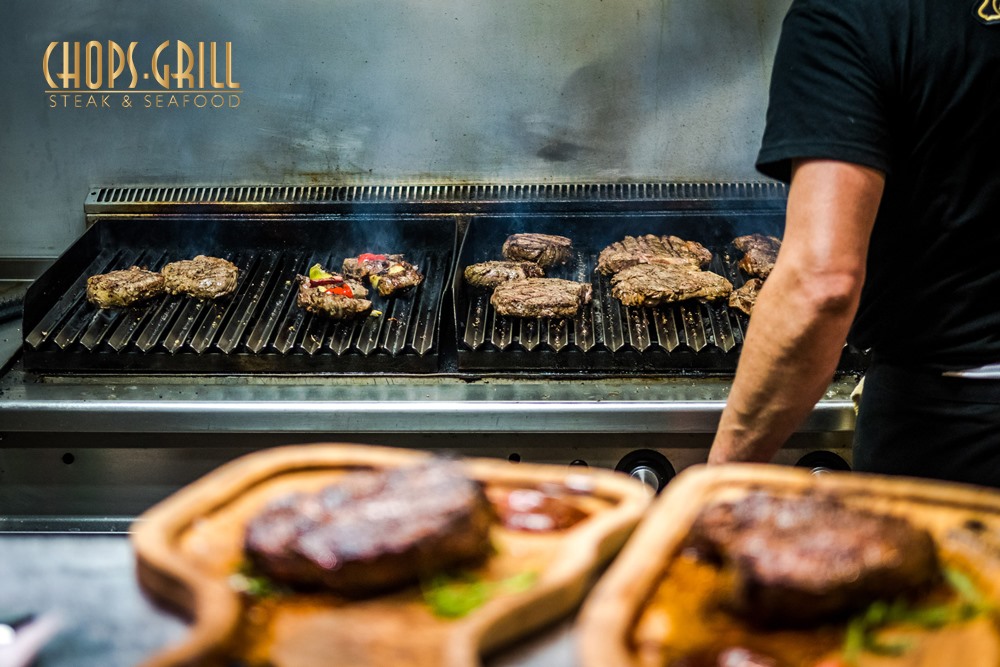
Are you planning an event(s) of your own soon?
On Saturday night we had a lot of reservations, due mainly to our Chopsylicious menu, which we have been doing for the last 7 years! Once we announced it this year, the interest was crazy. Everybody wants to try the menu, which is an excellent value for money. Diners can taste some of our products during the winter when they have more time. We have adjusted the menu to the season. For example, we are not selling the wagyu for 200 kuna. Instead, we changed the menu and are using it to test new dishes for next year. We are tracking what guests like and improving what is needed. When next season comes, we can introduce it to our menu. It's a win-win situation. And guests who like the Chopsylicious menu revisit us in the summer or recommend us to friends and family!
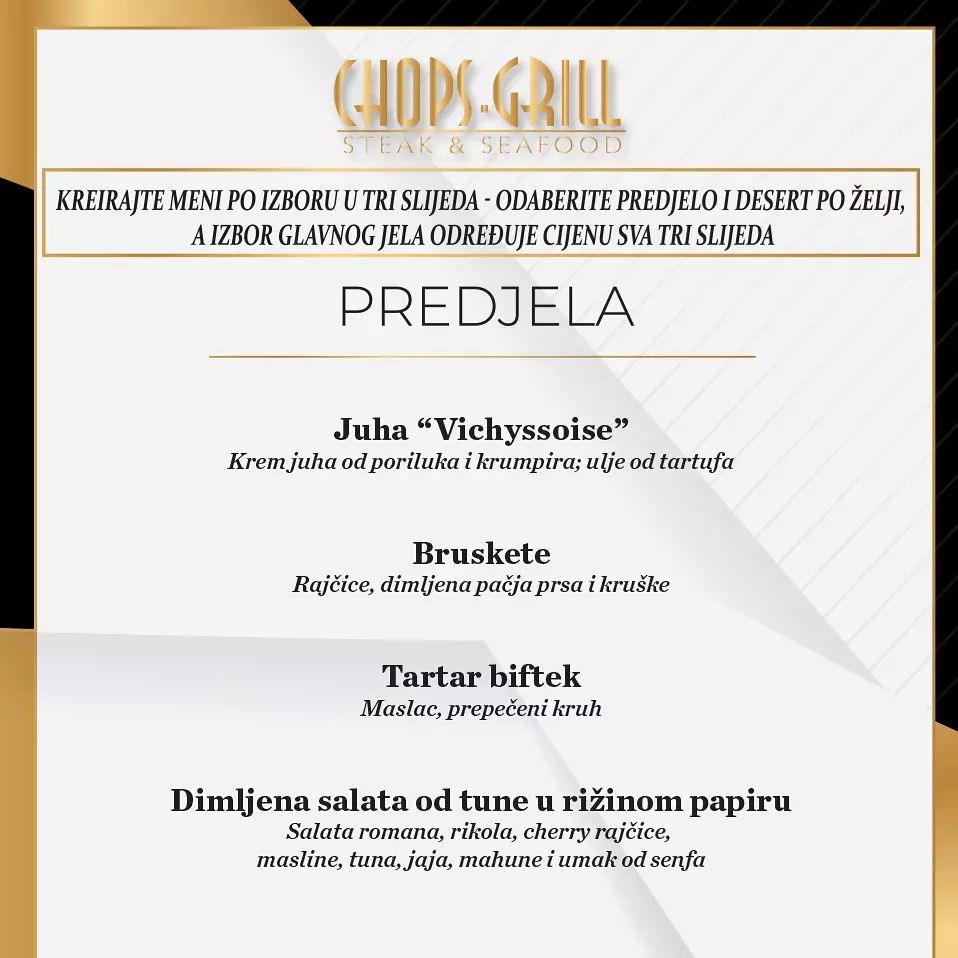
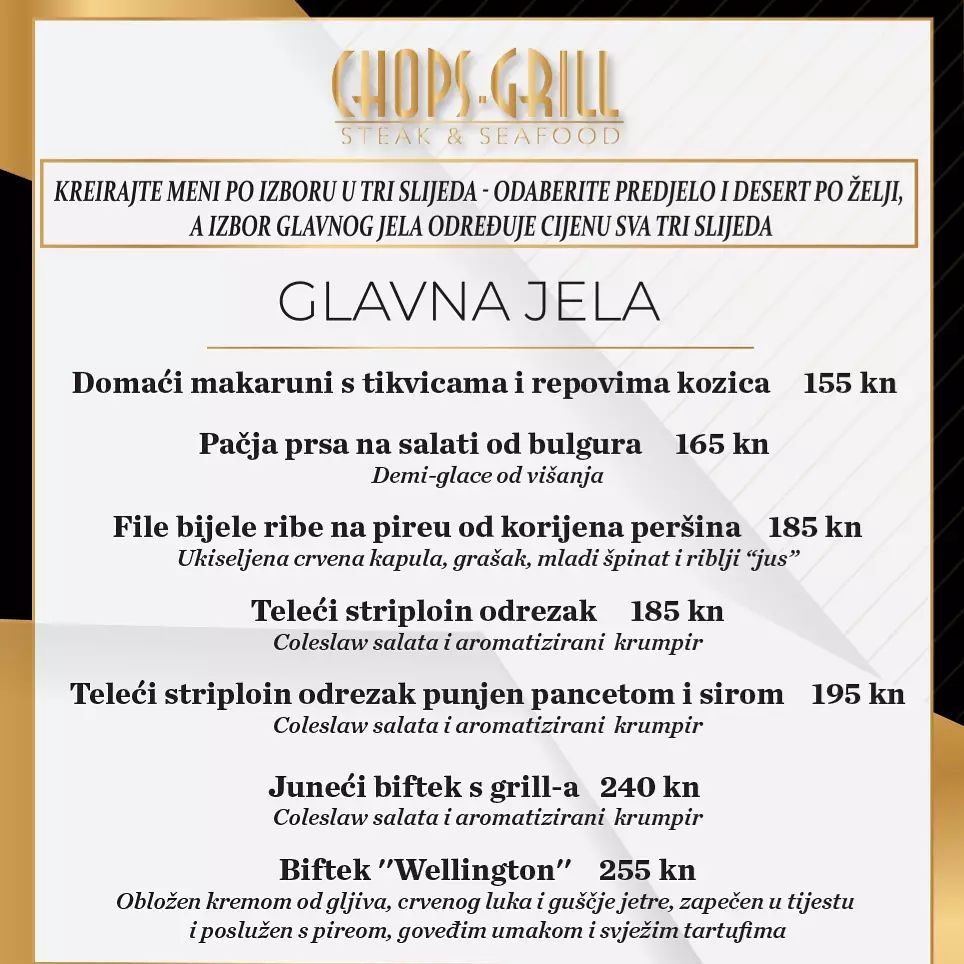
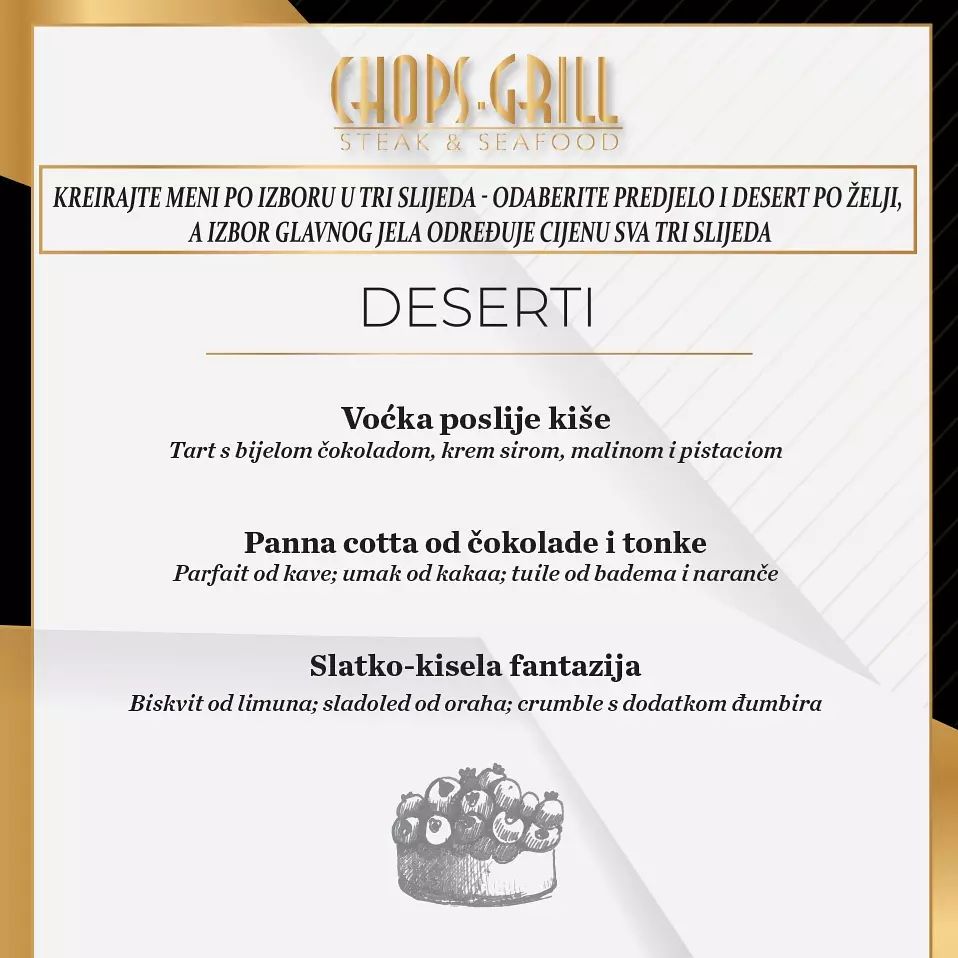
Besides Chopsylicious, we host two music professors from the Josip Hatze school who play inside the restaurant every weekend. Paradiso will be bringing in some light live music from next weekend, and we will begin decorating for Christmas as part of our winter wonderland. We have done it already for two years, and it's beautiful. This year we are going the extra mile to create a Christmas village. We will once again offer our breakfast sandwiches at Chops and Paradiso, so people will always have a place to eat and drink.
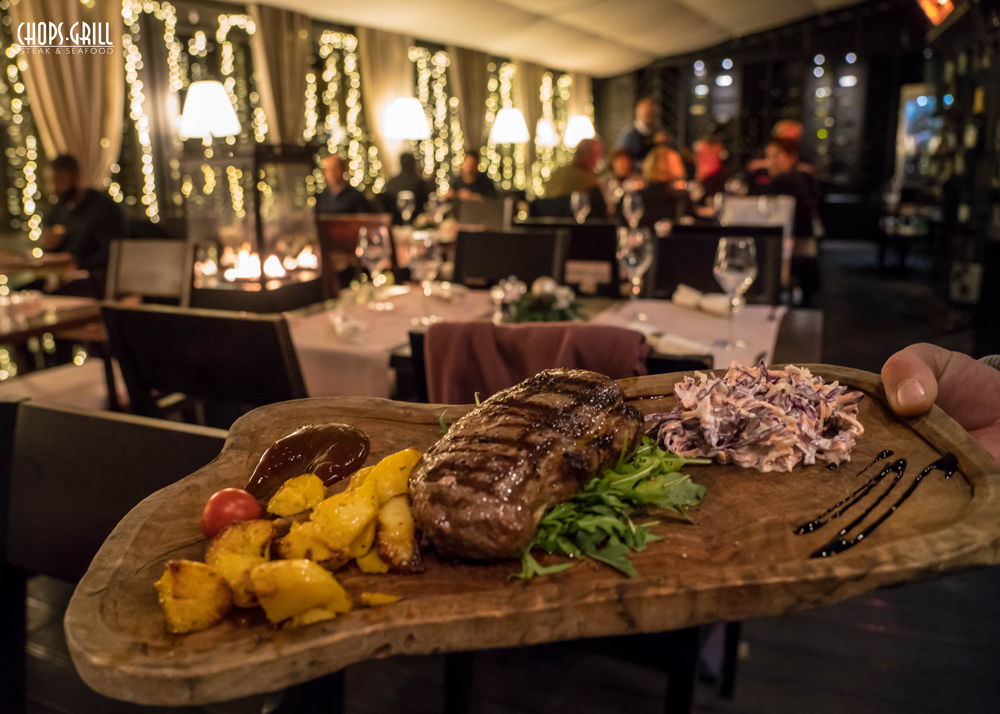
Will you close at all this year?
We always close from January 6 to March 1. It gives us a small break, but we also need to use the time to prepare for the season with renovations. We cannot preserve everything and need to repaint, repair the chairs, and the like. We also use this time to create the menu.
Back in 2020, we had plans to keep Chops open year-round. But, of course, the pandemic happened instead. That remains our ultimate goal, and I don't think we would have much trouble doing business even in January and February.
When winter tourism is mentioned, many locals say that they do not want it, as they are tired after the busy season. What is your perspective as a successful business owner?
We want it! We do need a break; everyone needs a break. I know I do because I have never worked harder on the operational side of things than this summer. But I only need about 15 days. I get nervous after that, haha. I need to do something actively; I cannot just twiddle my thumbs at home and not work because we had a 'successful season'. The Chopsylicious menu and our winter offer keep us busy, and I am happy we have that.
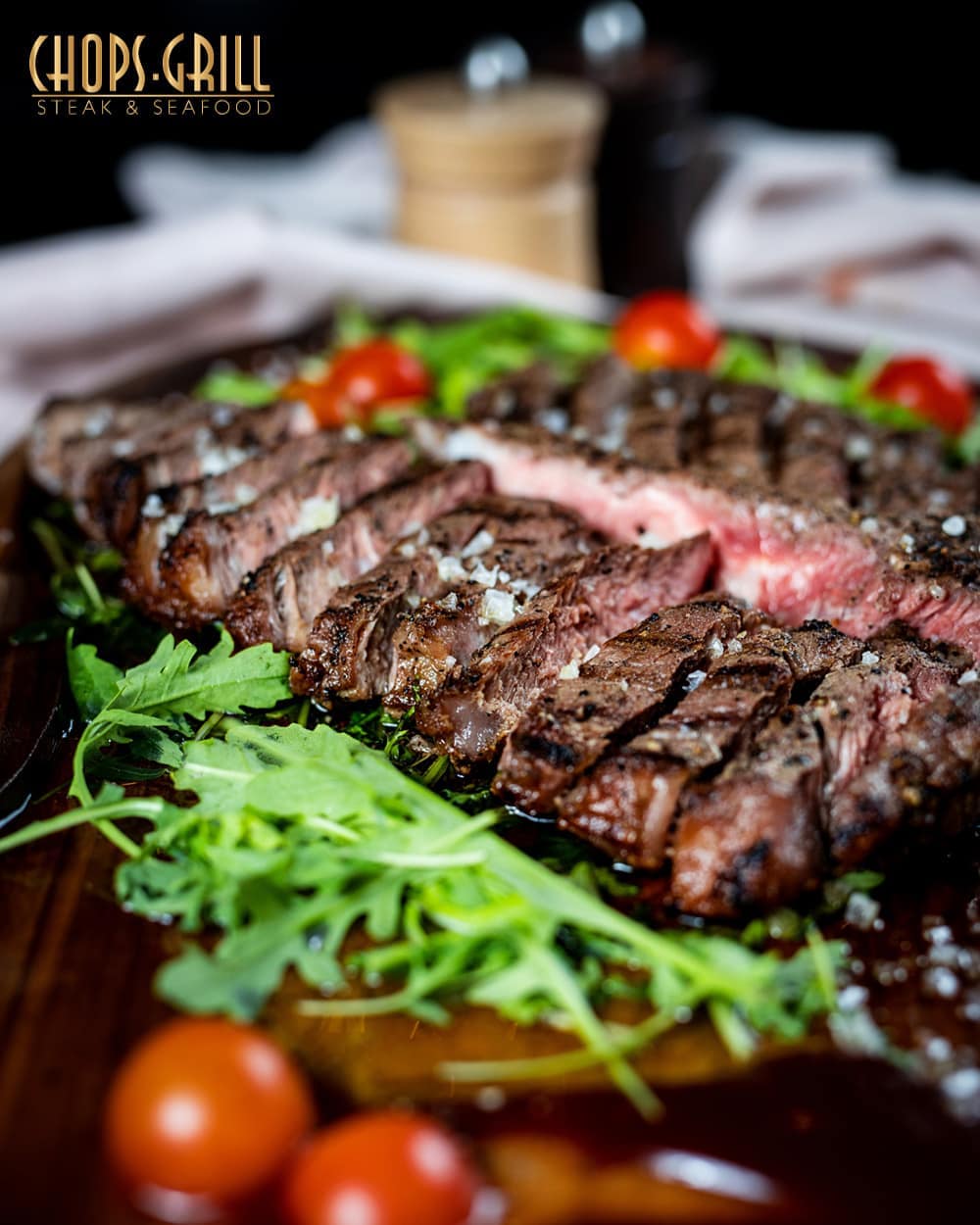
I would be terrified to close my doors for the entire winter. You cannot keep quality by doing that. Businesses that close in the winter also make the hospitality industry less desirable. It makes us a servant to our tourists. If you can work for an entire year, especially at a restaurant with a lot of business in the summer, and have good business throughout the winter with a year-round salary, then being a waiter is a beautiful job where you can support your family. Who wants to be a waiter only for 4 months? Then it's just a student job.
We care about our suppliers a lot and try to find a lower-cost product in the winter than the premium products we offer in the summer. With our chefs and their innovation, we create affordable dishes that guests can enjoy in the offseason. For example, the tuna salad on the Chopsylicious menu uses lower-cost ingredients but looks beautiful. The most expensive part of that dish is that someone had to come up with it in their head. If I am looking at that as the owner, the cost of that dish is lower, but someone needs to think about how to create that using the products available. That is why I invest in my staff throughout the year, and that is how you can adapt your offer in the winter to make sense for your restaurant and your guests.
What are the key steps in your opinion to getting more flights in winter? (Optional)
The Marriott (which will open eventually), Le Meridien Lav, Radisson Blu, and Atrium offer over 1,000 hotel rooms combined. All of those hotels have a spa, which I've already mentioned is crucial for city-break destinations. That's about 2,000 potential guests per day, offered beautiful hotels, great service and food, and indoor pools. If they all got together and spoke to a low-cost carrier about offering and filling these 1,000 rooms, that's a solution. It could almost be some non-formal tour operator. Say, for example, you buy the flight from a low-cost carrier and are offered reasonable rates at these hotels. This is especially important on the weekends when there are no business people from Zagreb in Split. But I truly believe these hotels with indoor pools need to come together; that is the only way it will work. Think - 2,000 people per day is 14,000 potential tourists per week. Those guests will be able to visit the hotel spa and swim, have a nice dinner in town, go to a cocktail bar, and even go to Joker for shopping!
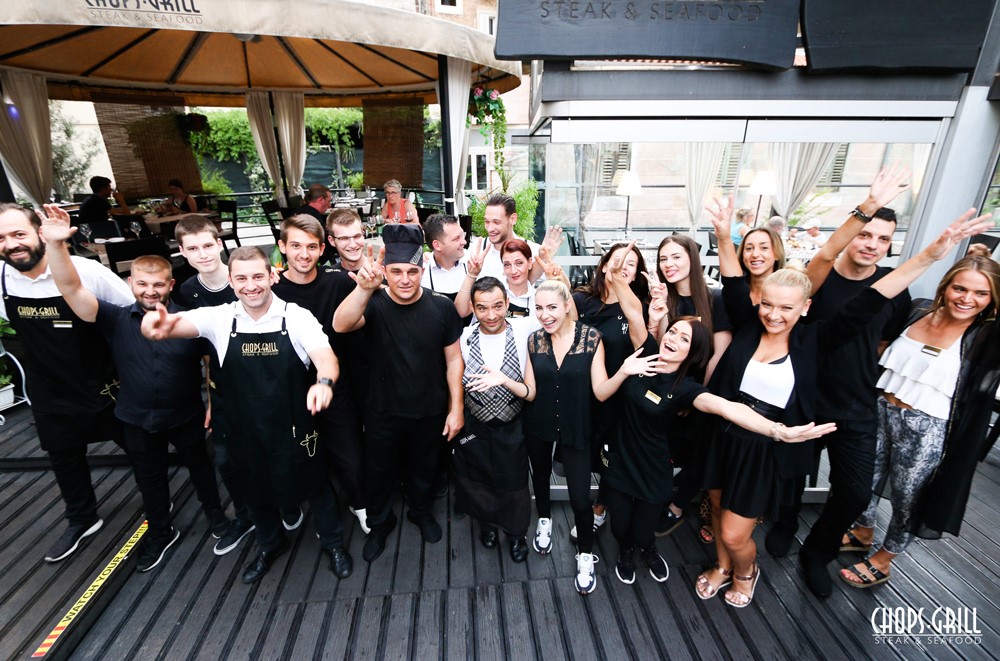
I would also try to create a promo video for tourists showing them exactly how their 4 days in Split would look, instead of just sharing Croatia's most beautiful destinations from above, usually without people. You could create a beautiful 'day-in-the-life' type of promo video showing exactly what you can expect on your Split trip. We need to show tourists what they can do here and not just share aerial footage.
Message to other businesses in Split?
If you stay open in winter, the summer will be easier since you can keep your staff. You'll offer better service, too. If you have both of those things, you'll earn even more money. And if we are all open during the winter, buying from our suppliers won't be as complicated!
Some businesses see each other as competition. If you have a city with many good restaurants, people visit for gastronomy, meaning they'll choose a new restaurant every day. Having more quality restaurants means more business for everyone. This would also help us to be recognized as an excellent gastronomic destination. We all need to support each other. Why can't other restaurants recreate the Chopsylicious idea? That is a wonderful idea, and it gives us more places to visit for dinner!
We also need to think about the minds of tourists and understand that they may not want to eat Dalmatian food every day of their trip. While local food should be enjoyed, it is impossible to expect that someone will eat grilled fish and blitva all the time. I know that when I am visiting Mexico, I cannot eat Mexican food every day. Sometimes you need a burger or pizza; comfort food that hits the spot and gives you a taste of home. And that is fine, too.
We offer eggs benedict on our breakfast menu and make the English muffins in-house because you cannot find them in Croatia. While we have to put in more work, knowing that our guests have that piece of familiarity is worth it. We also can't expect that every tourist likes eating fish or can peel scampi! A lot of these experiences may be new to them. That's why we should think about what tourists have available at home and try to recreate it in our way with traditional influences.
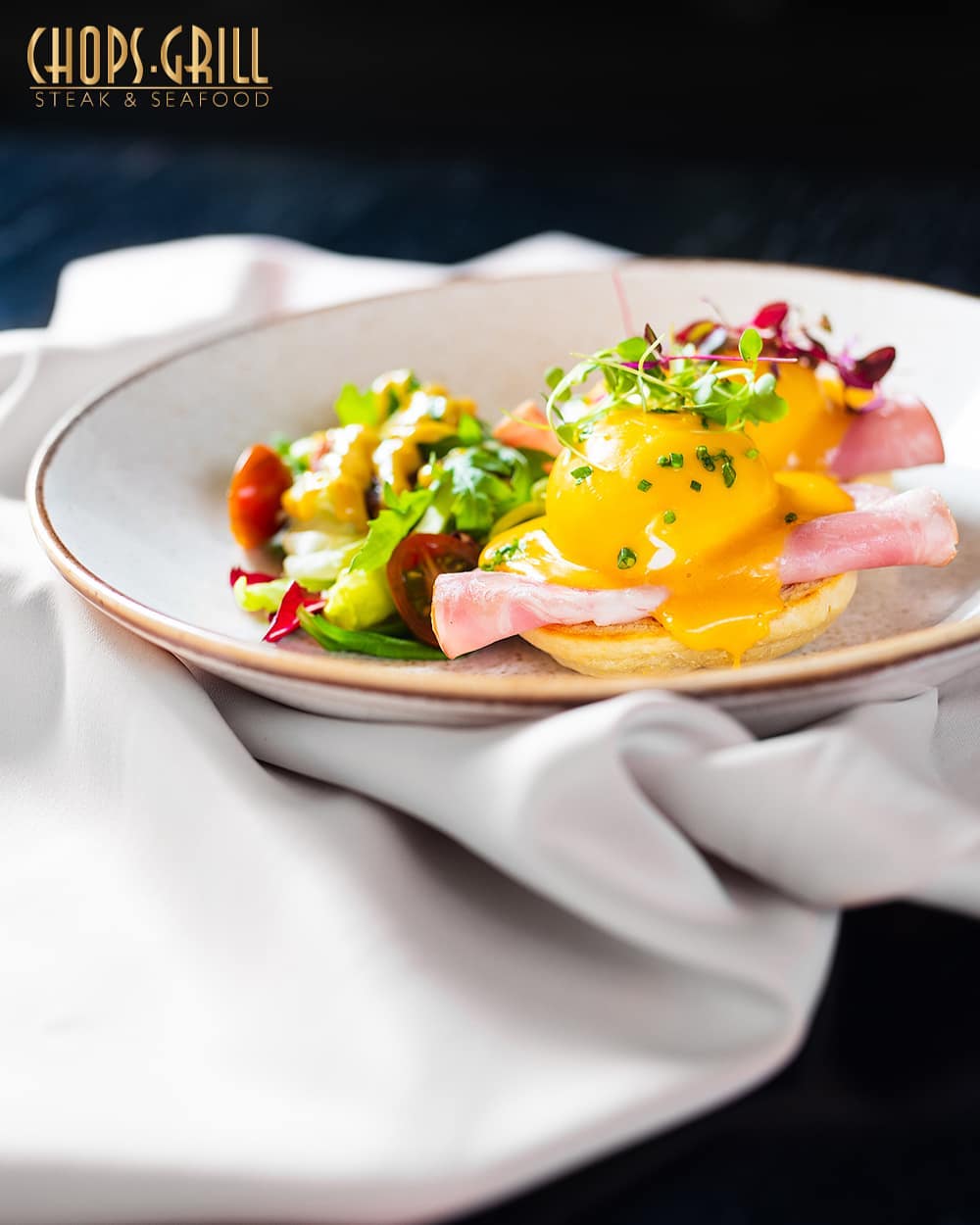
This is the direction we need to be going in. We should never lose our identity, but let's celebrate international cuisine with a Dalmatian twist.
You can explore Chops HERE.
If you are a business in Split with a winter program, please contact This email address is being protected from spambots. You need JavaScript enabled to view it. with the subject Split Winter Tourism.
Zlatko Dalić, Most Successful Croatia National Team Coach
November 15, 2021 - Croatia has qualified for the 2022 World Cup, making Zlatko Dalić the most successful Croatia national team coach we have seen.
Just over four years ago, Zlatko Dalić took over the Croatia national team at its worst. Led by Ante Čačić at the time, Croatia drew against Finland in Rijeka and needed an away victory against Ukraine to secure additional qualifications for the 2018 World Cup in Russia. Čačić was sacked, an unknown Dalić was announced as the coach, and proceeded to defeat Ukraine and Greece in additional World Cup qualifications. We all know what happens next.
Four years later, Zlatko Dalić became the first Croatia coach to take the national team to three major competitions. In the meantime, he led Croatia to the 2018 World Cup final. Zlatko Dalić is thus the most successful Croatia national team coach, reports Index.hr.
Since participating independently in UEFA and FIFA competitions, Croatia has missed only two major competitions - Euro 2000 and the 2010 World Cup. Miroslav 'Ćiro' Blažević and Slaven Bilić are the only two Croatia coaches comparable to Zlatko Dalić, considering they are the only coaches who have led the national team in more than 50 games. Interestingly, no other coach on the bench has endured more than 25 games, which only testifies to how explosive the Croatia bench is.
Ćiro Blažević was the only coach who could successfully lead the national team in the 90s, and with the bronze medal at the 1998 World Cup, he earned the 'coach of all coaches' nickname.
On the other hand, Slaven Bilić made the biggest tactical and personnel revolution in the national team's history. And with 42 wins in 65 games, he is by far the most successful coach in terms of win-loss ratios.
Nevertheless, after defeating Russia, Zlatko Dalić not only qualified for his third major competition in a row, but for the second time, he showed that he does not need additional qualifications for such an achievement. Furthermore, after a weak start, he showed that it was unnecessary to switch coaches to ensure the national team would come out on top in critical qualification moments, putting him ahead of Blažević and Bilić today.
From the beginning of his term, Zlatko Dalić was nearly doomed to fail, primarily because he was unknown compared to former coaches. He also did not have the full support of HNS and was seen as a temporary solution.
And Dalić's road to success was no walk in the park. Recall, Croatia experienced many painful defeats under Dalić, from losing a record 6:0 to Spain and another blunder against Portugal. Croatia has also played poorly against much weaker opponents, like Slovenia, Hungary, or Azerbaijan. And Dalić has not escaped media criticism.
However, the essential criteria for the success of a coach are qualifying for major competitions and getting good results. Dalić first took Croatia to the World Cup, reached the final for the first time, and then qualified for two major competitions, finishing first in the qualifying group.
No one before him has shown such peaks and continuity, and that is why the verdict is clear: as far as the Croatia national team and its coaches are concerned, Zlatko Dalić sits alone at the top.
To read more about sport in Croatia, follow TCN's dedicated page.
Croatia National Team Schedule in 2022: From Nations League to World Cup
November 15, 2021 - The Croatia national team schedule in 2022 is slowly coming together after the Vatreni qualified for the World Cup at Poljud on Sunday. But the World Cup isn't the only big competition Croatia will play next year.
The Croatia national football team defeated Russia at Poljud on Sunday and qualified for the 2022 World Cup, which Qatar will host from November 21 to December 18 next year, reports Gol.hr.
It will be Croatia's sixth World Cup and the third consecutive major competition in which the Vatreni qualified under coach Zlatko Dalić.
In addition to the World Cup host, Germany, Denmark, Brazil, Belgium, France, Serbia, Spain, and Croatia have qualified for Qatar. A total of 32 national teams will take part, but there is still a long way to complete the entire list of participants.
The World Cup group draw will be held on April 1, 2022, in Doha. On that day, coach Dalić and the players will learn the three national teams they will compete against in the group stage of the World Cup.
At this moment, while the European and other qualifications are still ongoing, it is impossible to know much more about Croatia's fate in the draw or the seed they will be given.
But before all of that, we have the UEFA Nations League.
Namely, on December 16, the draw for the 2022 Nations League will be held, and a day later UEFA, will announce the exact schedule of matches, which will be held in only two national team windows in 2022.
For example, four Nations League rounds will be played from June 2 to 14, and the remaining two in the second half of September (from 22 to 27).
This does not mean that Croatia will rest at the end of March. While Russia and the remaining second-placed national teams will play additional World Cup qualifications, Croatia will play maybe three friendly matches as part of the World Cup preparations. Therefore, it will be a great chance for Dalić to test the form of the current national team members and those players on his national team radar.
Significant dates for Croatia:
December 16, 2021: Nations League draw
December 17, 2021: Nations League match schedule announcement
March 21 to 30, 2022: 2-3 friendly matches
April 1, 2022: World Cup draw
June 2 to 4, 2022: First round of the Nations League
June 5 to 8, 2022: Second round of the Nations League
June 9 to 11, 2022: Third round of the Nations League
June 12 to 14, 2022: Fourth round of the Nations League
September 22 to 24, 2022: Fifth round of the Nations League
September 25 to 27, 2022: Sixth round of the Nations League
To read more about sport in Croatia, follow TCN's dedicated page.
Meet Michael Freer, New Director of Digital Nomad Association Croatia
November 14, 2021 - The Digital Nomad Association Croatia has a new director, Michael Freer.
A LinkedIn post from Dutch entrepreneur, Jan de Jong, President of DNA Croatia:
Please allow me to introduce you to Michael Freer - our newly appointed director at the Digital Nomad Association Croatia.
I don't think we could have found a better person for this position. Aside from Michael's long trackrecord working for NGO's and social responsible organizations - he was also the moderator of 3 Award winning digital nomad conferences in Croatia.
The combination of his deep understanding of the digital nomad subject - while having lived in Croatia for over 6 years - makes Michael the perfect individual who can help us to further elevate our efforts.
Up until now, we have already accomplished so much:
Croatia is a well-known and popular destination for digital nomads - ranked 2nd (after Japan)
Currently, Croatia is already hosting thousands of remote work professionals during the off-season.
The DN-community is growing every month
We have launched DNA Stay - where property owners can target digital nomads and where digital nomads can find mid- & long-term property rentals.
Now, the time has come to make even stronger efforts to unite and serve digital nomads and all other stakeholders in Croatia.
If you are a digital nomad in Croatia, or considering to come to Croatia - reach out to Michael.
If you are a business, interested in getting involved with digital nomads, don't hesitate to contact us.
If you want to list your property at DNA Stay - send an email to This email address is being protected from spambots. You need JavaScript enabled to view it.
If you are representing a destination, aiming to welcome more digital nomads - this is the moment to do so.
Either way - contact me or Michael directly over #LinkedIn or email ?? This email address is being protected from spambots. You need JavaScript enabled to view it.
Special thanks to our sponsors/donors Raiffeisenbank Hrvatska | Hrvatski Telekom | KPMG Croatia | Links - for making this possible. ??
Thank you all for your support, your engagement and your love!
Pozdrav,
Jan de Jong
President Digital Nomad Association Croatia
TCN caught up with Michael to learn more about his role at DNA Croatia, and his plans for the association
1. You have just started your position as Director of DNA Croatia - congratulations. Tell us firstly what is DNA Croatia, why do we need it, and what is your role?
Thanks Paul! DNA Croatia is here to support digital nomads and organisations working or hoping to work with digital nomads in Croatia. From before they arrive, to after they leave, we'll be helping DNs with their journey around Croatia, introducing them to the best places to work and play, whilst getting involved in the local community.
We'll be gathering their feedback and communicating this to the powers that be, in order to improve the conditions and ease for DNs to come and stay here. My role is to pretty much set this all up and get things moving, meet digital nomads and local organisations and find out what their needs are and develop a strategy for years to come.
2. What are the key areas of focus for DNA Croatia in the next 12 months?
Our five key areas are always: Community, Information, Representation, Education and Certification.
When it comes to the next 12 months, first and foremost we need to continue developing our Croatia wide community and get our membership up and running. We need to set up two way communication and information exchange to be proactive in ensuring the DN offer in Croatia is exactly what they're looking for.
At the same time a lot of outreach is needed to all cities and local organisations that want to be part of the DN route, and with that comes education and certification. This could range for a DNA Croatia stamp of approval for certain accommodation or that a MUP office is fully informed in the DN process. Finally it's reviewing the success of the year (starting with 2021!) and looking how we can further represent our DNs.
3. Summarise where Croatia is on the DN global map, and the progress that has been made in the last 12 months.
Croatia leapt ahead on the DN global map towards the end of 2020 and into the start of this year. This was mostly thanks to a range of amazing events that brought the right DNs here to further promote Croatia to their networks and a lot of social media buzz. The Digital Nomad Visa (sic) was launched, people were excited, and we've started having Croatian grandmas talk about digital nomads.
The rest of the world is catching up now, digital nomad visas are popping up here and there, so now we're going to have to push forward, develop the permit further, and engage as many people as possible to show why Croatia is the place to be for digital nomads. Progress is a constant, and we are ready to keep Croatia up there as one of the top digital nomad destinations.
4. What are the biggest challenges Croatia is facing to developing its DN story?
I don't think it's necessarily unique to Croatia, because the challenges revolve around very similar things.
First of all it is important that everyone understands who digital nomads really are and how they work. They aren't here for two weeks to spend their year's savings like a tourist, they're here for a longer period of time, traveling around and spending sustainably.
Then it's ensuring there's enough for them to do wherever they go, and in turn, having the community to support them, be it local or foreign. Community is a huge element of anyone on the road, and therefore local players need to ensure certain things to facilitate a community vibe and setting.
The final challenge is keeping the DN permit current and relevant. We saw how Jan was able to work in partnership with various ministries to push things through, and let's hope this will make it easier for any reviews and improvements.
5. How will DNA Croatia assist in developing the eco-system?
In 2017 I did an article with Slobodna Dalmacija about digital nomads. I worked with Split Tech City and interviewed a few of the nomads. I worked closely with Tanja from Saltwater and Tamara, formerly of WIP and now from The Works, to connect and run various events. Fast forward four years, and this weekend alone Split had three events for digital nomads, including a conference, a drinks and dinner social and a coffee meetup. I hope that my experience here in Split, and our collective work as DNA Croatia, can be shared and replicated across Croatia. DNA Croatia has already done so much in connecting the private, public and third sector, and we look to continue this, and hope the rest of the eco-system is ready to help us.
6. Tell us a little about your partner project, DNA Stay, which launched recently.
DNA Stay has just been launched, and serves as a central place for Digital Nomads to find accommodation, as we look to work with landlords to develop a friendlier rental market for those coming for at least a month. DNA Stay is actually owned by the udruga DNA Croatia, as we look to move towards being financially sustainable and into a social enterprise type model. This way we can generate our own funds to invest into some excellent community projects which have a long lasting and positive impact on the whole of Croatia.
You can follow the latest from DNA Croatia on the official website.
For more news and features on digital nomads in Croatia, check out the dedicated TCN section.
Human Milk Bank Has Fed 300 Babies on Pediatric Wards So Far
ZAGREB, 14 Nov, 2021 - The Human Milk Bank, established at the KBC University Hospital in Zagreb, has fed nearly 300 babies hospitalised on pediatric wards since its foundation.
The Human Milk Bank was opened in November 2019 and since then, of 400 mothers who expressed the wish to donate breast milk, 143 have become donors.
To date 1,118 litres of breast milk have been collected, and 724 litres of pasteurized milk have been used for infant feeding, said the bank which celebrates its second anniversary on 15 November.
The bank provides milk for babies in hospitals in Zagreb, Split, Osijek, Rijeka and Slavonski Brod.
For more on lifestyle, follow TCN's dedicated page.
For more about Croatia, CLICK HERE.


